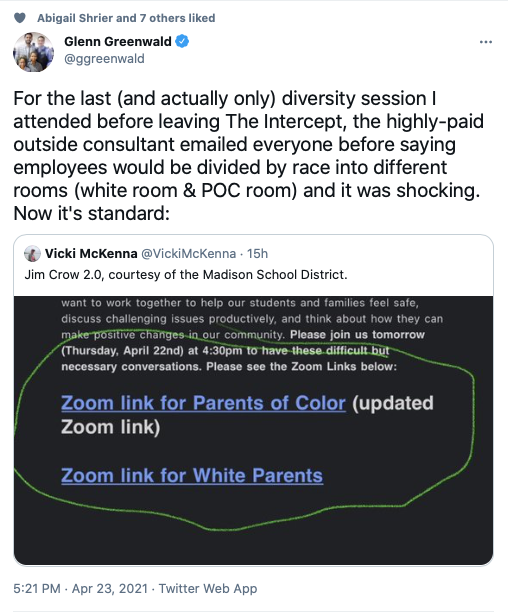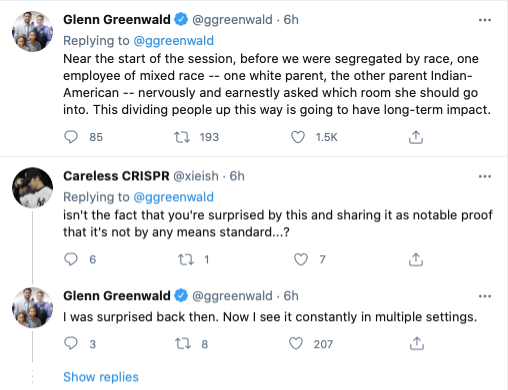Christopher Rufo summarizes the spread of critical race theory, characterizing these stories as the tip of the iceberg. His article: "The Courage of Our Convictions: How to fight critical race theory."
What does critical race theory look like in practice? Last year, I authored a series of reports focused on critical race theory in the federal government. The FBI was holding workshops on intersectionality theory. The Department of Homeland Security was telling white employees that they were committing “microinequities” and had been “socialized into oppressor roles.” The Treasury Department held a training session telling staff members that “virtually all white people contribute to racism” and that they must convert “everyone in the federal government” to the ideology of “antiracism.” And the Sandia National Laboratories, which designs America’s nuclear arsenal, sent white male executives to a three-day reeducation camp, where they were told that “white male culture” was analogous to the “KKK,” “white supremacists,” and “mass killings.” The executives were then forced to renounce their “white male privilege” and to write letters of apology to fictitious women and people of color.
This year, I produced another series of reports focused on critical race theory in education. In Cupertino, California, an elementary school forced first-graders to deconstruct their racial and sexual identities and rank themselves according to their “power and privilege.” In Springfield, Missouri, a middle school forced teachers to locate themselves on an “oppression matrix,” based on the idea that straight, white, English-speaking, Christian males are members of the oppressor class and must atone for their privilege and “covert white supremacy.” In Philadelphia, an elementary school forced fifth-graders to celebrate “Black communism” and simulate a Black Power rally to free 1960s radical Angela Davis from prison, where she had once been held on charges of murder. And in Seattle, the school district told white teachers that they are guilty of “spirit murder” against black children and must “bankrupt [their] privilege in acknowledgement of [their] thieved inheritance.”
I’m just one investigative journalist, but I’ve developed a database of more than 1,000 of these stories. When I say that critical race theory is becoming the operating ideology of our public institutions, I am not exaggerating—from the universities to bureaucracies to K-12 school systems, critical race theory has permeated the collective intelligence and decision-making process of American government, with no sign of slowing down.
The woke-infested media has, for the most part, given CRT advocates a free pass regarding the real-world affects of CRT. Rufo proposes asking that CRT advocates be forced to answer these questions:
Critical race theorists must be confronted with and forced to speak to the facts. Do they support public schools separating first-graders into groups of “oppressors” and “oppressed”? Do they support mandatory curricula teaching that “all white people play a part in perpetuating systemic racism”? Do they support public schools instructing white parents to become “white traitors” and advocate for “white abolition”? Do they want those who work in government to be required to undergo this kind of reeducation? How about managers and workers in corporate America? How about the men and women in our military? How about every one of us?
Rufo suggests advocating "excellence" rather than "diversity":
In terms of principles, we need to employ our own moral language rather than allow ourselves to be confined by the categories of critical race theory. For example, we often find ourselves debating “diversity.” Diversity as most of us understand it is generally good, all things being equal, but it is of secondary value. We should be talking about and aiming at excellence, a common standard that challenges people of all backgrounds to achieve their potential. On the scale of desirable ends, excellence beats diversity every time.
When we tell the story about the United States, we need to tell the whole story, the moral arc:
[W]e must promote the true story of America—a story that is honest about injustices in American history, but that places them in the context of our nation’s high ideals and the progress we have made toward realizing them.
Fighting back will require that good-hearted thoughtful people stand up to waves of abuse:
Above all, we must have courage, the fundamental virtue required in our time: courage to stand and speak the truth, courage to withstand epithets, courage to face the mob, and courage to shrug off the scorn of elites.





